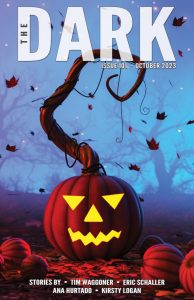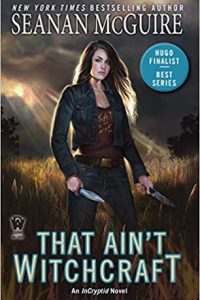Paula Guran Reviews The Sunday Morning Transport, Apex, and The Dark
 The Sunday Morning Transport 10/24/23, 9/10/23, 9/3/23
The Sunday Morning Transport 10/24/23, 9/10/23, 9/3/23
Apex #140
The Dark 9/23, 10/23
I know I am repeating myself, but every story The Sunday Morning Transport publishes should be read. Of the nine original stories published from the end of August through October 22, I’ll mention only my absolute favorites. Nura – in ‘‘We Will Witness’’ by Martin Cahill – is a 30th-century Witness, sent back in time to comfort the dying in their final hours. In the future, humankind has finally accepted that ‘‘trying to live forever was killing our planet, killing us.’’ No one dies alone. Nura must deal with the violent, senseless end of someone who ‘‘does not welcome death but is instead desperate, almost ferally attempting to stave it off as long as possible.’’ Well wrought, emotional, and moving. ‘‘Between Truth and Death on the Murmansk – Saint Petersburg Line’’ by Zohar Jacobs adroitly mixes magic, war, and politics in a Russia ‘‘overflowing with the dead, the undead, the might-as-well-be dead.’’ On leave from the Northern fleet, Dmitri, one-eighth rusalka and a Russian military (what else!) frogman, meets programmer Lev Abramovich on a lengthy train trip to Saint Petersburg. Lev is getting out of Russia for good. But on arrival in Saint Petersburg, it soon becomes obvious that, well, a major glitch has occurred. An awesome debut from Jacobs. A.R. Capetta’s highly imaginative ‘‘Resurrection Highway’’ introduces us to automancy – the power to resurrect cars from obsolescence. Vex raises a vehicle from the dead and picks up his old crew members Ting and Rye. The bonetrippers travel from California to Maine to rescue Edgar, their former driver. An intriguing world and characters; I would have loved to learn more.
Of the eight original tales in Apex #140, I particularly enjoyed two of the shorter offerings. Lucy Zhang’s ‘‘Life Wager’’ is only 3,300 words long but paints a complete picture. Set in a fantasy version of China, the story’s narrator is the offspring of a human mother and dragon father. She decides to descend to Earth, where she learns to play mah-jongg and winds up playing the emperor for his life. Fascinated, he eventually demands to marry her. Deceptively simple, it should be read more than once to fully appreciate its depth. Even shorter – 900 words – Rich Larson’s ‘‘Spitting Image’’ features two boys, one of whom has found a well that throws back anything thrown into it – slightly altered from the original state. Commendably creepy.
The Dark celebrated its 100th issue with four original stories rather than its usual two. The titular domicile of ‘‘House’’ by TJ Cimfel doesn’t want to be inhabited. Its defense will be (the story is written in future tense) to turn its new owner into an out-of-character – or, perhaps, true-to-character – irritable curmudgeon. In ‘‘Big Dead Clown Things’’ by Adam Callaway, two girls – the narrator and her cousin Philomena – are rather matter-of fact about the clown’s body they find floating in a stagnant pond. But then they don’t see clowns as human: ‘‘They were creatures, symbols, agents.’’ Things do get scarier, but they also get – at least for
for me – bewildering. Worth reading despite my befuddlement. ‘‘When the Wiliwili Blossoms, the Shark Bites’’ by Bryan Kamaoli Kuwada is set in Hawai’i a decade after Christian missionaries arrived. Kaiuli’s mother, a recent convert, has disappeared while fishing. Although there is no body, the Reverend Parker conducts a fu neral for the woman under her Christian name: Lydia. It is presumed she was devoured – as were, lately, another four local people – even though it is not the season for sharks. Soon, more folks disappear in or near the sea. Perhaps the killer is a Kupua, a monster with ‘‘shark’s jaws hidden between its shoulder blades…. The ocean is never as ravenous as the creature who shifts between man and shark.’’ But more than people are missing: memories and knowledge are disappearing as well. Kuwada’s story, based on Hawaiian indigenous tales, is refreshing and offers a monster that is probably new to many. There are a couple of nice twists to it too. Not impeccably executed, but it will carry you right along. Who can resist a story that begins with a murderous umbrella, as ‘‘Chop! Chop! Chop!’’ by Osahon Ize-Iyamu does? Neglected, evidently broken machines ‘‘left to time to be in a state of disrepair’’ simmer with rage and eventually kill. Short and slicingly sweet.
The central character in Tim Waggoner’s ‘‘The Destroyer of Small Things’’ is ‘‘a small man who’s led a small life, a person who’s hurt others as he’s blundered along over the years, without any real thought or consideration to his actions.’’ The lead-off story in The Dark #101, it is a nicely done Twilight Zone-ish tale – quite a bit more traditional than the magazine’s usual, self-proclaimed ‘‘unique horror.’’ ‘‘Zoraida la Zorra’’ by Ana Hurtado, the issue’s second original, is more along those lines. It has some interesting concepts, particularly the Machángara, a ‘‘river that eats women.’’ But it doesn’t completely hit the mark with a narrative I found confusing about a college student, Zoraida, whose conduct with men leads one character to feel she is la zorra – a ‘‘slut.’’
Recommended Stories:
‘‘We Will Witness’’, Martin Cahill (The Sunday Morning Transport 10/24/23)
‘‘Resurrection Highway’’, A.R. Capetta (The Sunday Morning Transport 9/3/23)
‘‘Between Truth and Death on the Murmansk – Saint Petersburg Line’’, Zohar Jacobs (The Sunday Morning Transport 9/10/23)
‘‘When the Wiliwili Blossoms, the Shark Bites’’, Bryan Kamaoli Kuwada (The Dark 9/23)
Paula Guran has edited more than 40 science fiction, fantasy, and horror anthologies and more than 50 novels and collections featuring the same. She’s reviewed and written articles for dozens of publications. She lives in Akron OH, near enough to her grandchildren to frequently be indulgent.
This review and more like it in the December and January 2023 issue of Locus.
 While you are here, please take a moment to support Locus with a one-time or recurring donation. We rely on reader donations to keep the magazine and site going, and would like to keep the site paywall free, but WE NEED YOUR FINANCIAL SUPPORT to continue quality coverage of the science fiction and fantasy field.
While you are here, please take a moment to support Locus with a one-time or recurring donation. We rely on reader donations to keep the magazine and site going, and would like to keep the site paywall free, but WE NEED YOUR FINANCIAL SUPPORT to continue quality coverage of the science fiction and fantasy field.
©Locus Magazine. Copyrighted material may not be republished without permission of LSFF.







